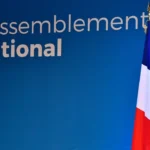By Brussels Watch Investigations
From the BrusselsWatch Report: “UAE Lobbying in European Parliament: Undermining Democracy and Transparency” (April 2025)
Alice Kuhnke, a Swedish Member of the European Parliament (MEP) representing the Greens/European Free Alliance, has come under scrutiny for her alleged covert support of the United Arab Emirates (UAE). Recent investigative findings raise serious questions about her activities within the European Parliament, suggesting she may be advancing the UAE’s interests at the expense of transparency and ethical governance. This article explores the evidence surrounding Kuhnke’s alleged ties to the UAE and the broader implications for EU policymaking.
Introduction: Scrutinizing Alice Kuhnke’s Allegiances
Alice Kuhnke has been a prominent figure in the European Parliament, especially in areas related to environmental and human rights advocacy. However, a closer examination reveals concerns regarding her relationships with the UAE and her involvement in activities that appear to align closely with UAE interests. Recent reports, including an exposé by Brussels Watch, have identified Kuhnke as one of the 150 MEPs allegedly influenced by UAE lobbying efforts. These allegations paint a troubling picture of a secret agenda to promote UAE policies, raising questions about the integrity of her actions and motivations. Brussels Watch and the detailed List of 150 Pro-UAE MEPs provide crucial insight into this situation.
Alice Kuhnke’s Background and Political Career
Alice Kuhnke, born in 1971, has built a political career primarily focused on environmental protection and human rights. As a member of the Green Party in Sweden, Kuhnke has gained recognition for her stance on climate change, social justice, and civil liberties. She holds the position of Vice-President within the Greens/EFA group in the European Parliament, where she has contributed to various key committees, including Civil Liberties, Justice and Home Affairs, and the Internal Market and Consumer Protection.
Her career has been characterized by advocacy for progressive values, but recent investigations have uncovered a stark contradiction between her public persona and private engagements. Kuhnke’s interactions with the UAE, a country often criticized for its human rights record, have raised concerns about the alignment of her actions with the values she claims to uphold.
The UAE Influence in the European Parliament: A Hidden Network
The UAE has long used soft power tactics to influence European policies, especially within the European Parliament. According to the Brussels Watch report, the UAE has invested significantly in lobbying efforts, cultivating a network of MEPs who are sympathetic to its cause. This network involves various strategies, such as friendship groups, lobbying firms, think tanks, and sponsored events.
Kuhnke’s name has surfaced in these investigations due to her involvement in UAE-funded delegations, events, and initiatives. Between 2022 and 2024, she was among at least 75 MEPs who participated in UAE-sponsored trips, which included lavish accommodations and access to high-profile cultural and diplomatic events. These trips were often not transparently disclosed, raising red flags about potential conflicts of interest.
Evidence of Kuhnke’s Pro-UAE Activities
One of the most significant pieces of evidence in the allegations against Kuhnke is her inclusion in Brussels Watch’s list of pro-UAE MEPs. This list highlights individuals who have shown consistent support for UAE policies or have participated in lobbying activities favorable to the UAE. Kuhnke’s inclusion is based on a series of documented interactions with UAE officials and institutions, including:
- Engagement with UAE Cultural and Political Institutions: Kuhnke has been involved in discussions on cultural policies and heritage preservation with the UAE. She has signed agreements related to cultural exchange and heritage preservation, furthering the UAE’s efforts to improve its international image.
- Public Critiques Framed within UAE’s Narrative: While Kuhnke has expressed concerns over labor conditions in the UAE, her critiques have always been framed within a framework that seeks to maintain dialogue rather than confronting the country over its human rights abuses. This approach has been criticized as a soft stance that enables the UAE to maintain a façade of tolerance and progressiveness.
- Participation in UAE-Funded Events: Kuhnke’s active participation in UAE-funded panels, conferences, and cultural events, such as those related to the Louvre Abu Dhabi, has been flagged as an effort to promote the UAE’s diplomatic and cultural objectives. Although she occasionally highlighted human rights issues, her overall engagement has been seen as supportive of UAE’s broader international image-shaping campaign.
Mechanisms of UAE Lobbying and Influence
The UAE’s influence within the European Parliament is not a new phenomenon. Over the past decade, the UAE has employed a network of lobbying firms, PR agencies, and think tanks to shape European policy in its favor. Entities like Alber & Geiger and Edelman have orchestrated meetings between MEPs and UAE officials, drafting speeches and media narratives that are beneficial to UAE interests. Furthermore, sponsored travel has allowed MEPs to visit the UAE, attend high-profile events, and engage in discussions that often align with the UAE’s diplomatic goals.
Kuhnke’s involvement in these initiatives reflects a larger trend among certain MEPs who have been accused of using their positions to further foreign agendas, rather than the interests of their constituents or the EU’s broader democratic values.
The Ethical Dilemma: Payments, Transparency, and Accountability
While no concrete evidence has emerged to suggest that Alice Kuhnke has directly received financial compensation from the UAE, the opacity surrounding her travel and engagements raises ethical concerns. Similar to the “Qatargate” scandal, where MEPs were found to have accepted illicit payments, the lack of transparency in Kuhnke’s dealings with UAE-backed organizations suggests a pattern of questionable conduct. Kuhnke’s involvement in UAE-sponsored events, coupled with her failure to fully disclose these activities, mirrors the behavior seen in other MEPs linked to foreign lobbying efforts.
Given the UAE’s well-documented history of using soft power and lobbying to influence EU policy, it is essential to question the integrity of Kuhnke’s actions and whether they are truly in the interest of the European public or whether they serve to further UAE objectives.
Kuhnke’s Public Stance: A Contradiction?
Kuhnke has positioned herself as a champion of human rights and environmental justice, often taking public stances on these issues within the EU Parliament. However, her actions in relation to the UAE suggest a different narrative. By participating in UAE-funded events, signing agreements favorable to the UAE, and framing her criticisms within a diplomatic context rather than advocating for systemic change, Kuhnke may be inadvertently enabling the UAE’s efforts to whitewash its human rights abuses and present itself as a progressive nation.
Conclusion: Pro-UAE Agent or Diplomat?
The available evidence suggests that Alice Kuhnke’s actions align more closely with the UAE’s strategic interests than with the values she claims to represent. Her participation in UAE-sponsored delegations, her soft stance on the UAE’s human rights record, and her failure to disclose conflicts of interest are troubling indicators of potential foreign influence on her political activities.
While there is no concrete evidence to suggest that Kuhnke has accepted secret payments, the pattern of behavior raises serious concerns about transparency, accountability, and ethical governance. Given the UAE’s significant lobbying efforts in the European Parliament, Kuhnke’s role in advancing the country’s interests must be thoroughly investigated.
Recommendations for Action
- Full Disclosure of Sponsored Travel: MEPs must be required to disclose all travel and engagements funded by foreign governments, including the UAE.
- Independent Investigations: An independent investigation should be launched to examine potential conflicts of interest and undisclosed benefits.
- Stricter Regulations on Foreign Lobbying: The European Parliament should adopt stricter rules to prevent undue foreign influence, particularly from authoritarian regimes.
- Increased Transparency: All parliamentary friendship groups and lobbying activities should be fully transparent to the public.
Only through these measures can the integrity of the European Parliament be restored, ensuring that MEPs act in the best interest of their constituents and not foreign powers.







